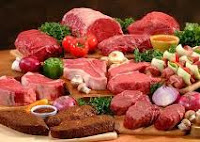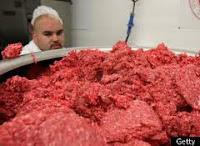What's that about red meats, burgers and steaks?
Notes on the methodology: The scientists evaluated the raw data for their two cohorts, Los Angeles County site (LA), and San Francisco Bay Area (SFBA), individually.
The scientists excluded over- (>6,000kcal) and undereaters (<600kcal) and applied two different models with...
Dietary data was queried by food frequency questionnaires and commonly used cooking module that would elicit the degree of doneness and browning (participants were given photos to pick from).
According to what I bet you have already or will soon read (and probably even see on TV), researchers from the UCLA have finally identified why red meat is so bad for you - it's the frying! Strangely, though, it's only bad if you fry hamburgers and what's more, you better be Hispanic if you want to make sure it will give you prostate cancer (see image 3)... if we take the ScienceDaily article on the matter as a reference, we will yet find this information only, if we are not satisfied with the "gist" the author gives us as an introduction:The scientists excluded over- (>6,000kcal) and undereaters (<600kcal) and applied two different models with...
- model 1 adjusting for age (years), BMI (<25, 25-29, ≥30), total calorie intake (kcal/ day) and family history of PCA (yes/ no) and
- model 2 adjusting for age (years), BMI (<25, 25-29, ≥30), total calorie intake(kcal/ day), family history of PCA (yes/ no), total fat intake (g/ day), alcohol consumption (g/ day), cigarette smoking (pack-years),total fruit consumption (g/ day), total vegetable consumption (g/ day)
Dietary data was queried by food frequency questionnaires and commonly used cooking module that would elicit the degree of doneness and browning (participants were given photos to pick from).
"Research from the University of Southern California (USC) and Cancer Prevention Institute of California (CPIC) found that cooking red meats at high temperatures, especially pan-fried red meats, may increase the risk of advanced prostate cancer by as much as 40 percent."And you bet that 90% of the readers will do just that: They read "40% increase in prostate cancer risk" and tell themselves either"I will finally go vegan, like Steve jobs" or "F*** it, I love my red meat!" The 10% who are still undecided will then go on and find a few neat quotes like
"The observations from this study alone are not enough to make any health recommendations, but given the few modifiable risk factors known for prostate cancer, the understanding of dietary factors and cooking methods are of high public health relevance"
- Mariana Stern, associate professor of preventive medicine at the Keck School of Medicine of USC
Which show us that (contrary to the mass media) the scientists are well aware of the exploratary nature of their study, so take the following elaborations of the study not as a critique of Stern, Joshi, Corral, et al. whose study is exemplary in the way they are finally going beyond the "all red meats are created equal" approach that is so prevalent in epidemiological studies, but as an example of why third-hand information (even if this is my hand ;-) is never absolutely reliable.What statistical significant findings were there actually?
I won't bore you any longer with additional moralizing and try my very best to refrain from too much interpretation... ah, let's just take a look at what we have
- age is a factor for LA residents, not for San Francisco residents (older = more cancer)
- cigarette smoking makes a significant difference only in LA
- race is highly predictive in both LA and the San Francisco bay area
- high dietary fat intake increases the risk significantly in LA and borderline significantly in SFBA
- alcohol intake, fruit, veggies, and dairy don't make a difference
 |
| Image 2: The total amount of red meat (irrespective of how it was prepared) did not stat. significant increase prostate cancer risk |
- the absolute amounts of red meat, hamburgers, steaks, poultry, processed meat, bacon, sausages and homemade gravy regardless of how it's processed
- red meat, when it is grilled, broiled or baked
- hamburgers, when they are well done
- steaks, when they are well done or high temperature cooked
- poultry, when it is grilled, oven broiled, pan-fried, baked, high temperature cooked or well-done
So where are those 40% increases then? I see only statistically insignificant stuff!
You do in fact have to get your glasses out to find p-values with p < 0.05, which mean that the chances that the given increase in the risk of developing prostate cancer are just coincidence are below 5% and therefore "statistically significant"... now I did just that for you, got my glasses and hope I did not overlook one of the few that are actually in there - and since this is what the laypress considers the most important, I even drew a graph for ya ;-)
 |
| Image 3 (getty images): The hispanic guy in the back could increase his PC risk by 40, 80 and 160% (low, medium, high intakes), almost 2x more than non-hispanic whites; African Americans are "immune" against high-temperature cooked burgers -20, -10 and +10% nonsignificant changes in HR (p = .725) |
Things you won't hear in the news: "Bad meat" that will reduce your prostate cancer risk
If we thus put faith in the negative news, we should yet also appreciate the positive ones of which you probably won't read anywhere else but at the SuppVersity. Actually quite a pitty, as even among the "bad red meats" there appear to be some that are not so bad after all - at least if you prepare them correctly:
- poultry - 10-30% reduced hazard ratios (HR) for advanced prostate cancer for Q2, Q3 and Q4 intakes of poultry with the highest (=30% reduction) for Q4, and a daily intake of more than 35.7g / 1,000kcal
- home made gravy - 30% reduced HR for local prostate cancer risk (borderline significant p = 0.06) after adjustment for age, BMI, calorie intake, family history of prostate cancer, total fat intake, alcohol, smoking, fruit and veggie consumption.
| Current Age | 10 Years | 20 Years | 30 Years |
|---|---|---|---|
| 30 | 0.01 | 0.32 | 2.49 |
| 40 | 0.31 | 2.52 | 8.30 |
| 50 | 2.30 | 8.30 | 14.40 |
| 60 | 6.62 | 13.36 | 16.11 |
| 70 | 8.50 | 11.97 | N/A |
In view of the fact that the average omnivore male human being probably eats way more meat it may no seem as if 90%+ of us were doomed to develop advanced prostate cancer and that may well be the case if we would not be talking about if we were not talking about increases in hazard risk from a certain baseline. If we take the 2010 study by Altekruse et al. as a baseline (see table 1) our +30% increase in hazard risk would thus mean that a man who is now 40 years old would have a +0.1% increase of developing cancer in 10 years, a +0.8% increase to suffer from prostate cancer when he is 60 and a +2.5% greater risk with 70 (please remember that this data is at best of qualitative nature as calculations like this are outright unscientific and that's not just because the "average American" who is captured in the SEER data from 1975-2007 will definitely be a red meat eater ;-)
- Altekruse SF, Kosary CL, Krapcho M, Neyman N, Aminou R, Waldron W, Ruhl J, Howlader N, Tatalovich Z, Cho H, Mariotto A, Eisner MP, Lewis DR, Cronin K, Chen HS, Feuer EJ, Stinchcomb DG, Edwards BK (eds). SEER Cancer Statistics Review, 1975–2007, National Cancer Institute. Bethesda, MD, based on November 2009 SEER data submission, posted to the SEER Web site, 2010.
- Joshi AD, Corral R, Catsburg C, Lewinger JP, Koo J, John EM, Ingles S, Stern MC. Red meat and poultry, cooking practices, genetic susceptibility and risk of prostate cancer: results from the California Collaborative Prostate Cancer Study. Carcinogenesis. 2012 Jul 20.
- Spence JD, Jenkins DJ, Davignon J. Egg yolk consumption and carotid plaque. Atherosclerosis. 2012 Aug 1.
- University of Southern California - Health Sciences (2012, August 16). Pan-fried meat increases risk of prostate cancer, new study finds. ScienceDaily. Retrieved August 17, 2012, from http://www.sciencedaily.com /releases/2012/08/120816170404.htm#.UC3I26LCdzU.facebook












0 comments:
Post a Comment